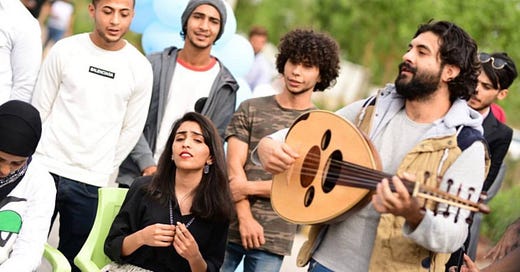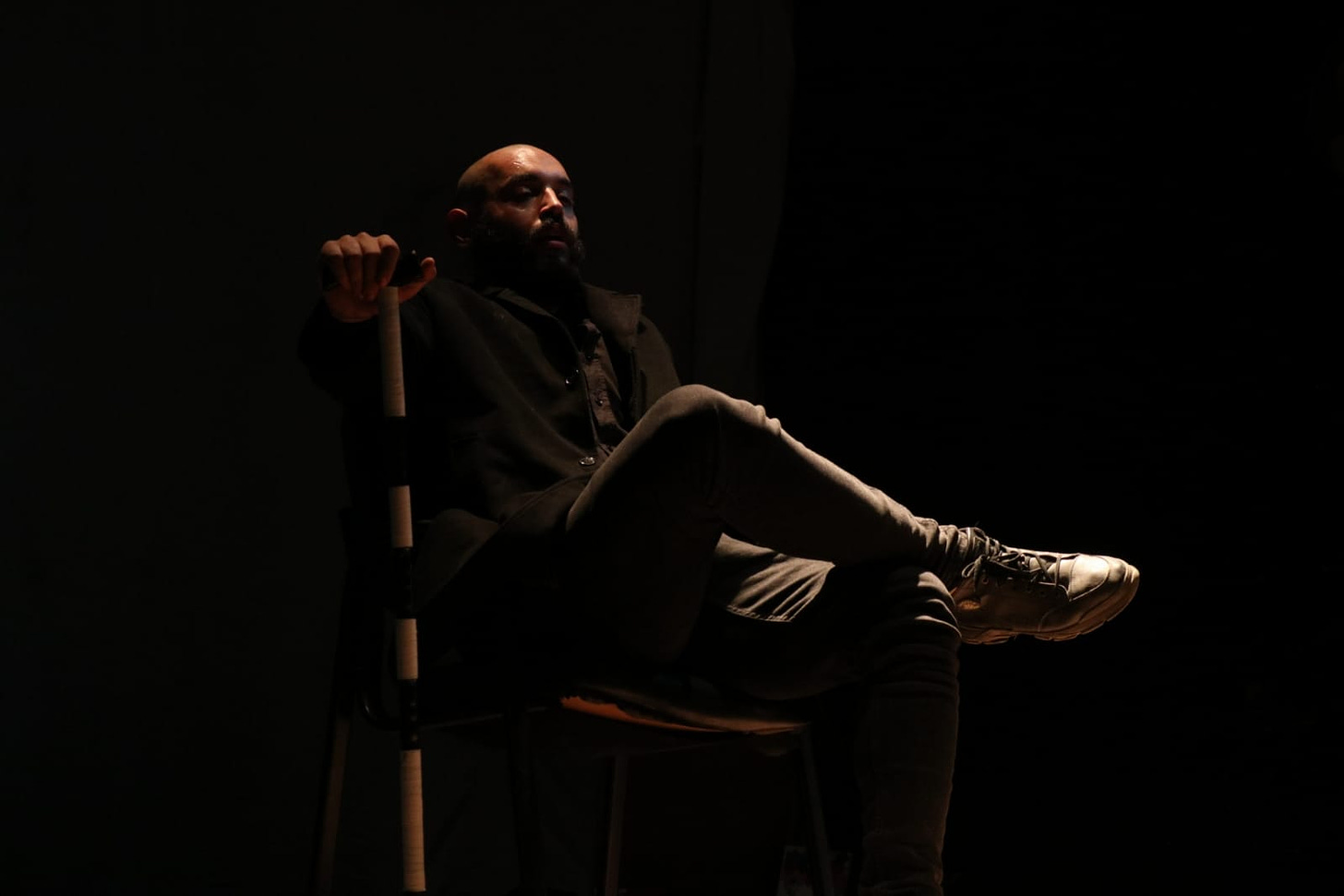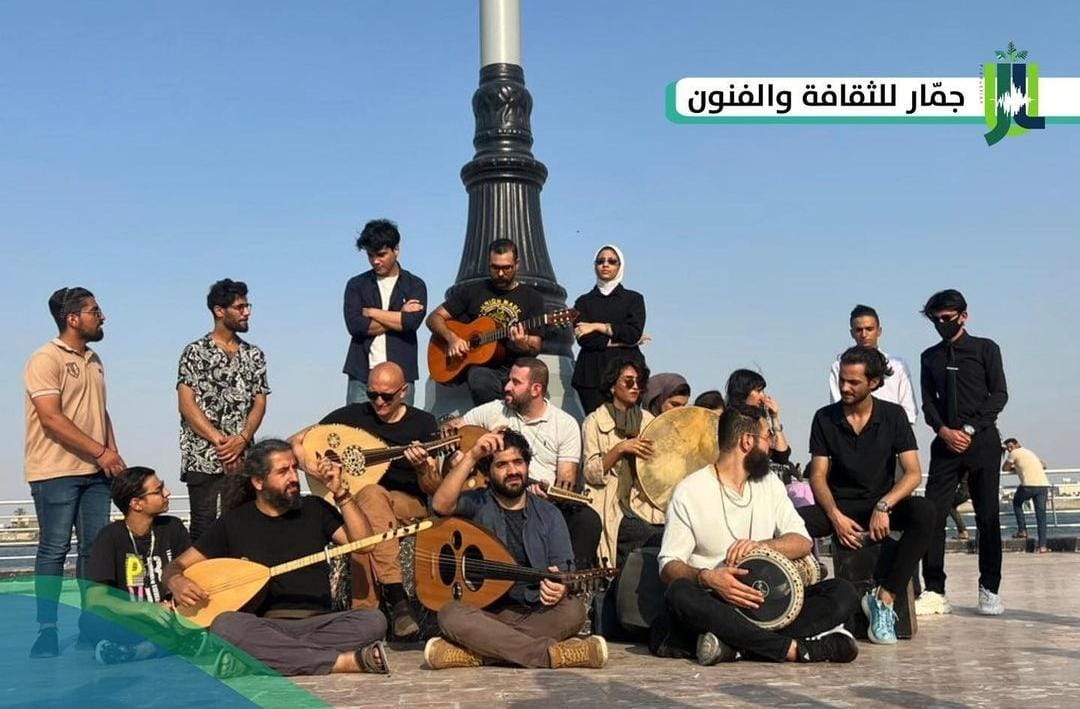Harmony in the Midst of Hardship: Reviving Basra's Cultural Legacy Through the Arts
Ali Elmadanie hopes to reclaim Basra as Iraq’s cultural capital and restore hope to a jaded population.
Lining up on the street, Ali Elmadanie could feel his heart pounding as people moved into position. It was evening time, and passersby were pausing, curious at this unusual display. Afterward, he would say it felt exhilarating, empowering, to lose themselves in the sound of the music, as they performed en masse in the middle of Basra.
“People were amazed, but nobody tried to stop us. Maybe some onlookers didn’t approve, but they didn’t say anything,” says Elmadanie, who organizes theatre and music performances in Basra through his arts organization Jummarts.
His aim is to support aspiring artists and revive the conservative city’s faded reputation as Iraq’s cultural capital. “We want to get people accustomed to seeing arts again – remind them that it’s part of their identity,” he adds.
Basra is a long way from the city that birthed some of Iraq’s most famous musicians and once hosted major poetry competitions. Today, the city is better known for its oil and gas reserves, a would-be boomtown, where half-completed construction projects loom over slums that stand in stark contrast to the huge houses owned by a small elite that harbors its wealth.
At one point, there was hope that Basra would be another Dubai, but its vast concentration of crude reserves has done little to dispel the poverty of a province mired in corruption. Instead, decades of conflict have sown division and discontent, presided over by powerful militias who rule through intimidation. “After successive wars, people have lost interest in arts,” Elmadanie says.
Jummarts is trying to revive that interest and restore Basra’s identity as a place where the arts can flourish. With help from an Ideas Beyond Borders Innovation Hub grant, they have moved to a larger premises and purchased new equipment to expand their operations and reach more people. “We are trying to make society more inclusive and in harmony with itself. That way people can live freely and safely and at peace,” Elmadanie says.
Before the fighting that fractured its community, Basra was a place where people of all ethnicities mingled and worked. As Iraq’s only seaport, it welcomed travelers from around the world, absorbing the different cultural influences they brought with them.
“If we go back a few decades, not even that far, Iraqi society was living in harmony,” Elmadanie says. “Music and art remind people of the things they have in common - the more people focus on the arts, the more they will dwell on the beautiful things that make them human and one single community.”
This is a vision he shares with Ideas Beyond Borders. “Listening to a Jummarts musical performance reminds us of another Iraq, with a rich culture and a history of creativity,” says Faisal Al Mutar, President of Ideas Beyond Borders. “It’s by supporting enterprises like this that we come closer to this Iraq and the opportunities it offers for a generation eager to discover their talents.”
Many of the musical instruments that come from Iraq were invented in Basra, like the Khashaba, a narrow hand-held drum made of wood. Anyone familiar with the country’s musical tradition knows the distinctive sound of the Khashaba, but playing it is difficult. “It’s a more specialized instrument, it doesn’t play notes,” explains Elmadanie, who runs classes in traditional Iraqi instruments like the Khashaba and the Darbouke to teach a new generation and prevent these skills from dying out.
Between lessons, Elmadanie and the Jummarts troupe of musicians and actors perform at restaurants and hotels, playing music and putting on plays. Elmadanie earns enough to make a living from this work, which is rare in Iraq. “We have a saying that arts will not put food on your table,” he says. Jummarts is trying to change that by giving people the chance to develop their talent while creating a more hospitable environment for artists in Basra.
The interest is there, he says, but a small group of organizations run all the art activities in the city, and it’s not open to the public. “It’s a consortium of a very few organizations, and they are not inclusive. That’s the difference I’m trying to make.”
Growing up in one of the city’s poorest neighborhoods, he worked hard to gain a degree in engineering but found an outlet for his creativity in theatre, attending workshops and participating in performances before moving on to writing and directing plays. Jummarts came from his desire to share this passion with more people and invite everyone to take part, particularly people with disabilities who have few opportunities to participate in Basra’s small creative sector.
“Before the arts, I used to see the world with my eyes. Now I see the world with everybody’s eyes,” Elmadanie says.
He dreams of a time when Basra is not synonymous with conflict and oppression, or the oil that has been more of a blight than a blessing on the city’s sidelined population. In reviving Basra’s cultural legacy, he hopes to reclaim its scattered soul and bring hope to a population weary of struggle. “When you go on Google and search the name of any Iraqi city, the pictures show explosions and destruction. I want people to search Basra and see something positive in the results, like our projects.”
This article was written by Olivia Cuthbert.






